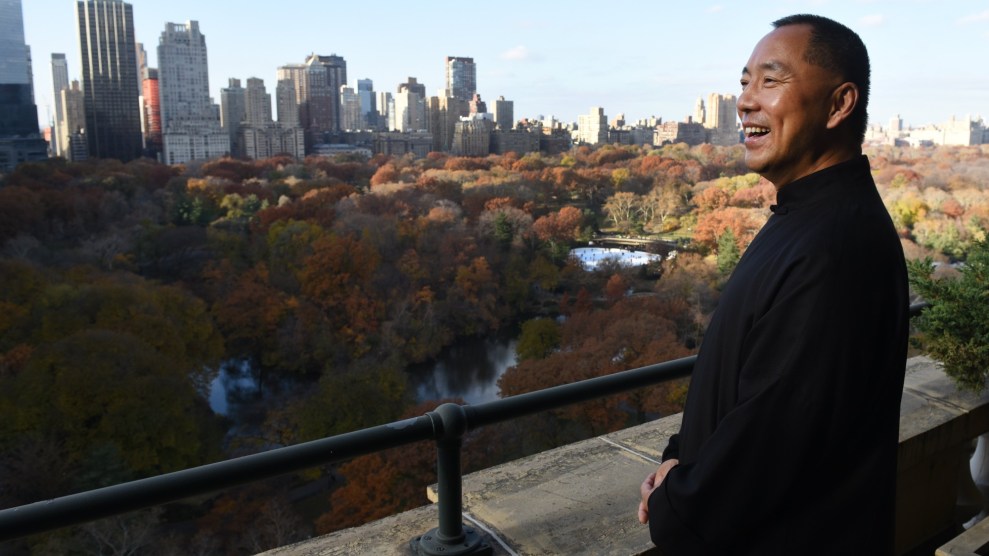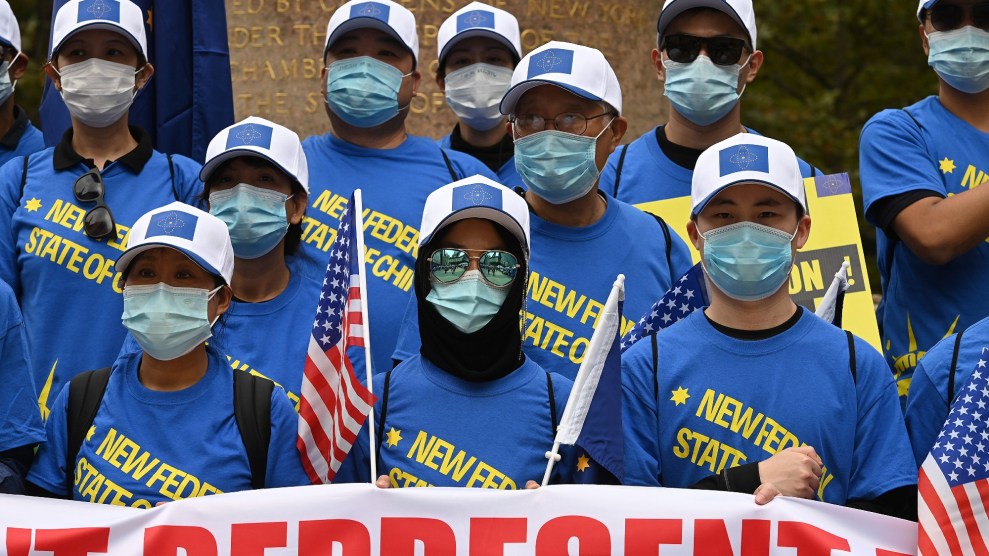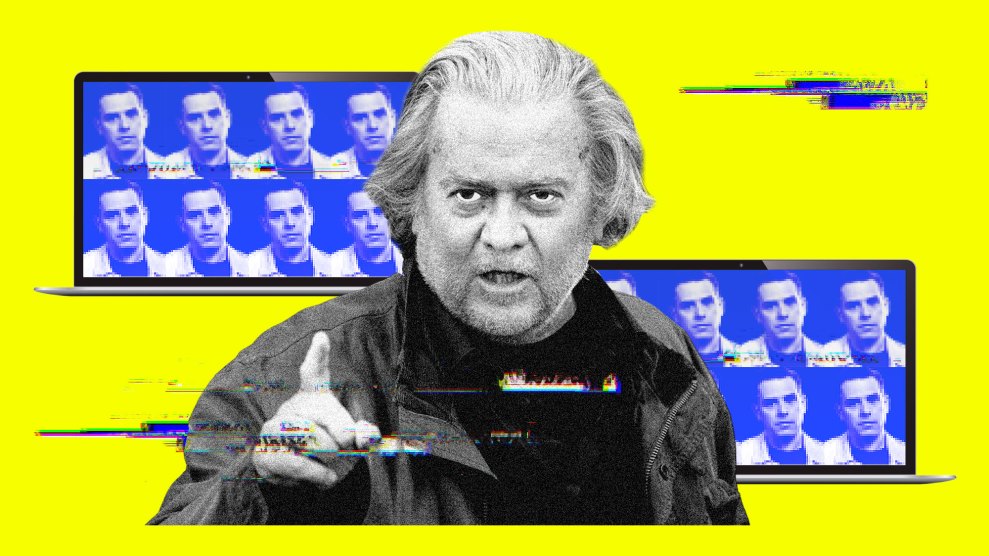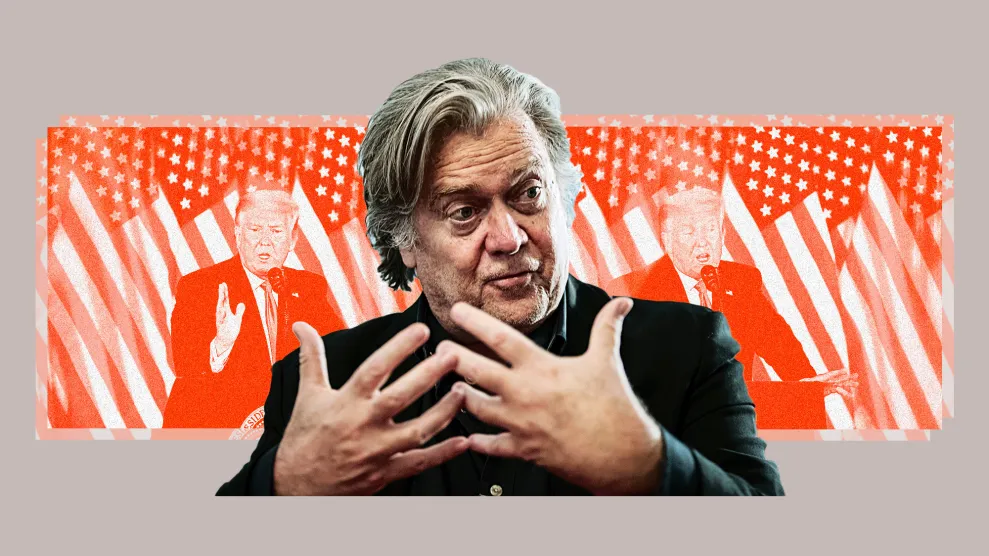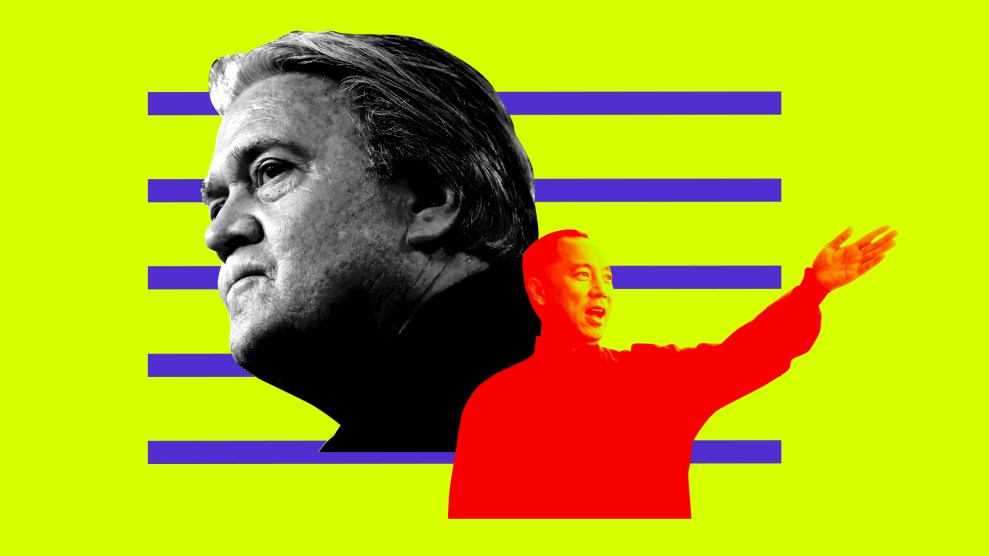
Mother Jones; Anna Moneymaker/Getty, Timothy A. Clary/AFP/Getty
In late November 2021, Steve Bannon appeared in a live broadcast on GTV, a media outlet that he’d helped his friend Guo Wengui launch a year earlier. Bannon used the appearance to celebrate HCoin, a supposed cryptocurrency that Guo was selling. The currency, Bannon said, was a “monumental” and “extraordinary” success. Bannon also hailed the Himalaya Exchange, Guo’s purported platform for trading digital assets like HCoin. Bannon lauded GTV. He even touted Guo’s fashion company. These ventures, Bannon suggested, were an opportunity for Guo’s fans, mostly Chinese emigres, to hurt China’s rulers. “If you look at institutionalization of the counteroffensive to Chinese Communist Party, it’s pretty impressive,” Bannon gushed.
That was just one of numerous occasions in which Bannon has heaped praise on Guo and his companies, often in venues where his words mostly reach Guo’s anti-Communist followers.
On Wednesday, federal agents arrested Guo and accused him, along his former financier William Je, of stealing more than a $1 billion from thousands of Guo’s own supporters by soliciting investments in some of the same companies that Bannon has promoted. Prosecutors said those companies were mostly fraudulent. An early HCoin valuation at a preposterous $27 billion, they said, was completely fake, as was the blockchain technology Guo and Bannon claimed supported it. Guo—who fled China in 2014 ahead of separate criminal charges there—allegedly used investors’ money to fund a lavish lifestyle, including a Ferrari, two $36,000 mattresses, and a yacht on which Bannon himself has lived. Guo allegedly did this while claiming in federal bankruptcy court to have almost no assets. Guo, who did not receive bail Wednesday, has pleaded not guilty.
In multiple indictments and an SEC complaint Wednesday, federal law enforcement also offered a broader critique of the joint project Bannon and Guo have taken on over the past five years. Prosecutors suggested that an entire constellation of companies and nonprofits that Bannon and Guo have launched together, which they collectively dub the “whistleblower movement,” was largely a con. That “counteroffensive to Chinese Communist Party” that Bannon touted was just a means for Guo to line his pockets, the feds said.
Bannon has not been charged with any crimes related to Guo. Bannon, his lawyer, and a spokesman did not respond to repeated inquiries. Bannon is not mentioned in any of the federal charging documents. And no evidence has emerged showing that he knew about the alleged diversion of investor funds at the heart of the charges against Guo.
Still, Bannon gave vital assistance to Guo’s operation. The former top aide to Donald Trump not only publicly cheered on companies that Guo allegedly used to rip off fans, but also privately advised Guo on how to solicit investments in those companies.
FBI and SEC agents, who are still investigating Guo’s capers, have sought information about Bannon’s work for the Chinese mogul, according to two people contacted by agents. One source said that agents asked for details on Bannon’s role advising Guo on soliciting investment funds in 2020.
Starting in the spring of 2020, Guo raised hundreds of millions of dollars by offering backers a chance to invest in what Guo said was a private offering of shares in GTV. Information sent to potential investors named Bannon as a member of GTV’s board.
Bannon also played a larger role than was publicly known in the GTV offering, people familiar with the effort told Mother Jones. These sources said that Bannon privately advised Guo, Je, and others on the GTV offering. Bannon also provided advice on a follow-up venture called G|Clubs, sources said. Guo claimed that membership in this club —which cost between $10,000 and $50,000—would provide participants with the opportunity to buy discounted stock in other Guo ventures. Prosecutors said that members actually received “few to no discernible membership benefits.”
It’s uncertain how Bannon might have been compensated for that work. Axios reported that Guo paid Bannon $1 million under a year-long contract that ended in August 2019 and that the men discussed another one-year deal. But it’s not clear if they ended up signing one.
Bannon was also a board member of the Rule of Law Society, one of two similarly named nonprofit organizations Guo launched with Bannon’s help. Prosecutors date the start of Guo’s alleged fraud to 2018, when Bannon and Guo announced the launch of the nonprofits and claimed they would investigate Chinese government corruption. Guo used the organizations “to amass followers who were aligned with his purported campaign against the Chinese Communist Party and who were also inclined to believe [Guo’s] statements regarding investment and moneymaking opportunities,” the indictment states. Then Guo “provided false and materially misleading information…to defraud” those followers, it charges.
Bannon helped Guo promote his Rule of Law nonprofits, regularly extolling them. In 2020, Bannon joined Guo in launching “the New Federal State of China,” which was underwritten by the same two nonprofits and claimed to be a government-in-waiting prepared to replace China’s rulers. Bannon has helped Guo push the claim that these groups pose a serious threat to China’s government. But as Mother Jones has reported, Guo and his supporters have wildly exaggerated their activities while simultaneously using these groups to raise large sums of money.
In August 2020, Bannon was arrested on board Guo’s yacht and was charged by federal prosecutors with conspiring to defraud an unrelated charity. Trump ultimately pardoned Bannon, but the arrest resulted in Bannon’s removal from official positions with both GTV and the Rule of Law Society. Last year, Bannon was hit with similar charges in New York state. Meanwhile, he has continued to promote Guo’s ventures and to lavish praise on Guo’s financial and political acumen, sometimes calling Guo “the George Washington of the new China.” Since Wednesday’s charges, however, Bannon seems to have said nothing publicly about his jailed ally.

